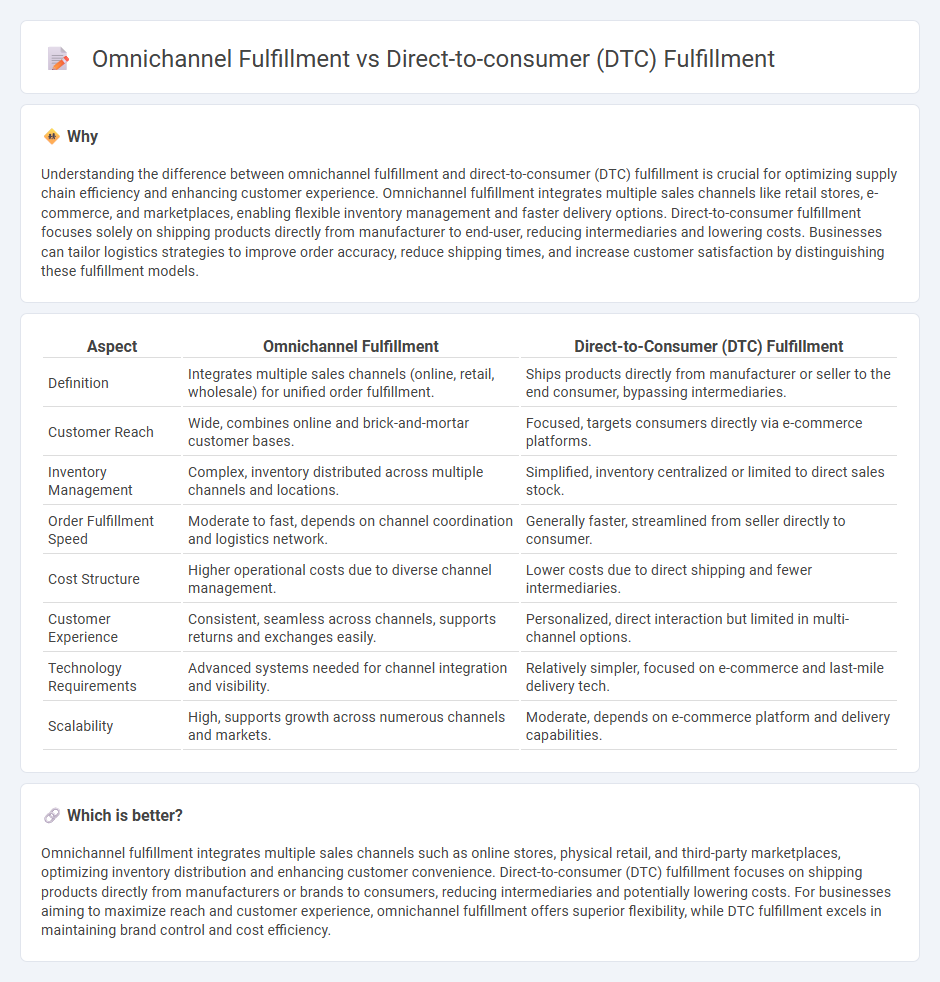
Omnichannel fulfillment integrates multiple sales channels such as retail stores, online marketplaces, and direct shipping to deliver a seamless customer experience, while direct-to-consumer (DTC) fulfillment focuses exclusively on shipping products directly from manufacturers to end customers. Omnichannel strategies optimize inventory distribution and order processing across various touchpoints, enhancing flexibility and scalability in logistics operations. Explore the unique advantages and challenges of omnichannel and DTC fulfillment to optimize your supply chain management.
Why it is important
Understanding the difference between omnichannel fulfillment and direct-to-consumer (DTC) fulfillment is crucial for optimizing supply chain efficiency and enhancing customer experience. Omnichannel fulfillment integrates multiple sales channels like retail stores, e-commerce, and marketplaces, enabling flexible inventory management and faster delivery options. Direct-to-consumer fulfillment focuses solely on shipping products directly from manufacturer to end-user, reducing intermediaries and lowering costs. Businesses can tailor logistics strategies to improve order accuracy, reduce shipping times, and increase customer satisfaction by distinguishing these fulfillment models.
Comparison Table
| Aspect | Omnichannel Fulfillment | Direct-to-Consumer (DTC) Fulfillment |
|---|---|---|
| Definition | Integrates multiple sales channels (online, retail, wholesale) for unified order fulfillment. | Ships products directly from manufacturer or seller to the end consumer, bypassing intermediaries. |
| Customer Reach | Wide, combines online and brick-and-mortar customer bases. | Focused, targets consumers directly via e-commerce platforms. |
| Inventory Management | Complex, inventory distributed across multiple channels and locations. | Simplified, inventory centralized or limited to direct sales stock. |
| Order Fulfillment Speed | Moderate to fast, depends on channel coordination and logistics network. | Generally faster, streamlined from seller directly to consumer. |
| Cost Structure | Higher operational costs due to diverse channel management. | Lower costs due to direct shipping and fewer intermediaries. |
| Customer Experience | Consistent, seamless across channels, supports returns and exchanges easily. | Personalized, direct interaction but limited in multi-channel options. |
| Technology Requirements | Advanced systems needed for channel integration and visibility. | Relatively simpler, focused on e-commerce and last-mile delivery tech. |
| Scalability | High, supports growth across numerous channels and markets. | Moderate, depends on e-commerce platform and delivery capabilities. |
Which is better?
Omnichannel fulfillment integrates multiple sales channels such as online stores, physical retail, and third-party marketplaces, optimizing inventory distribution and enhancing customer convenience. Direct-to-consumer (DTC) fulfillment focuses on shipping products directly from manufacturers or brands to consumers, reducing intermediaries and potentially lowering costs. For businesses aiming to maximize reach and customer experience, omnichannel fulfillment offers superior flexibility, while DTC fulfillment excels in maintaining brand control and cost efficiency.
Connection
Omnichannel fulfillment and direct-to-consumer (DTC) fulfillment are interconnected through their focus on enhancing customer experience by streamlining order processing across multiple sales channels and delivering products directly to consumers. Both strategies leverage integrated warehouse management systems and real-time inventory visibility to optimize supply chain operations and reduce delivery times. This connection enables businesses to efficiently manage inventory, improve shipping accuracy, and respond swiftly to consumer demands in a competitive logistics environment.
Key Terms
Inventory Management
Direct-to-consumer (DTC) fulfillment centralizes inventory in dedicated warehouses or fulfillment centers, enabling faster order processing and streamlined stock control for online sales. Omnichannel fulfillment integrates inventory across multiple sales channels, including physical stores and online platforms, requiring sophisticated real-time inventory management systems to optimize stock levels and minimize stockouts. Explore how advanced inventory management solutions can enhance efficiency in both DTC and omnichannel fulfillment models.
Order Routing
Order routing in direct-to-consumer (DTC) fulfillment prioritizes speed and cost-efficiency by directing orders from centralized warehouses directly to customers. Omnichannel fulfillment employs a dynamic order routing strategy, leveraging multiple channels such as brick-and-mortar stores, distribution centers, and third-party logistics to optimize stock availability and delivery speed. Explore in-depth insights on how advanced order routing technologies can enhance fulfillment accuracy and customer satisfaction.
Distribution Channels
Direct-to-consumer (DTC) fulfillment channels involve shipping products directly from the manufacturer or brand to the end customer, bypassing traditional retail intermediaries to ensure faster delivery and personalized experiences. Omnichannel fulfillment integrates multiple distribution channels--such as online stores, physical retail locations, and third-party logistics--providing a seamless and flexible fulfillment strategy that optimizes inventory management and customer satisfaction. Explore how leveraging the right mix of distribution channels can elevate your fulfillment strategy and drive business growth.
Source and External Links
DTC Fulfillment Explained: How DTC is Changing eCommerce - This article explains the DTC fulfillment process, which involves direct sales from manufacturers to customers, enhancing the customer experience and efficiency.
What Is DTC Fulfillment? Benefits, Challenges and Steps - This blog post discusses the DTC fulfillment process, highlighting its benefits and challenges for ecommerce businesses looking to control their sales and logistics.
A Short Guide to Direct-To-Consumer (DTC) Order Fulfillment - This guide outlines key components and best practices for setting up a successful DTC order fulfillment system, emphasizing memorable customer experiences.
 dowidth.com
dowidth.com